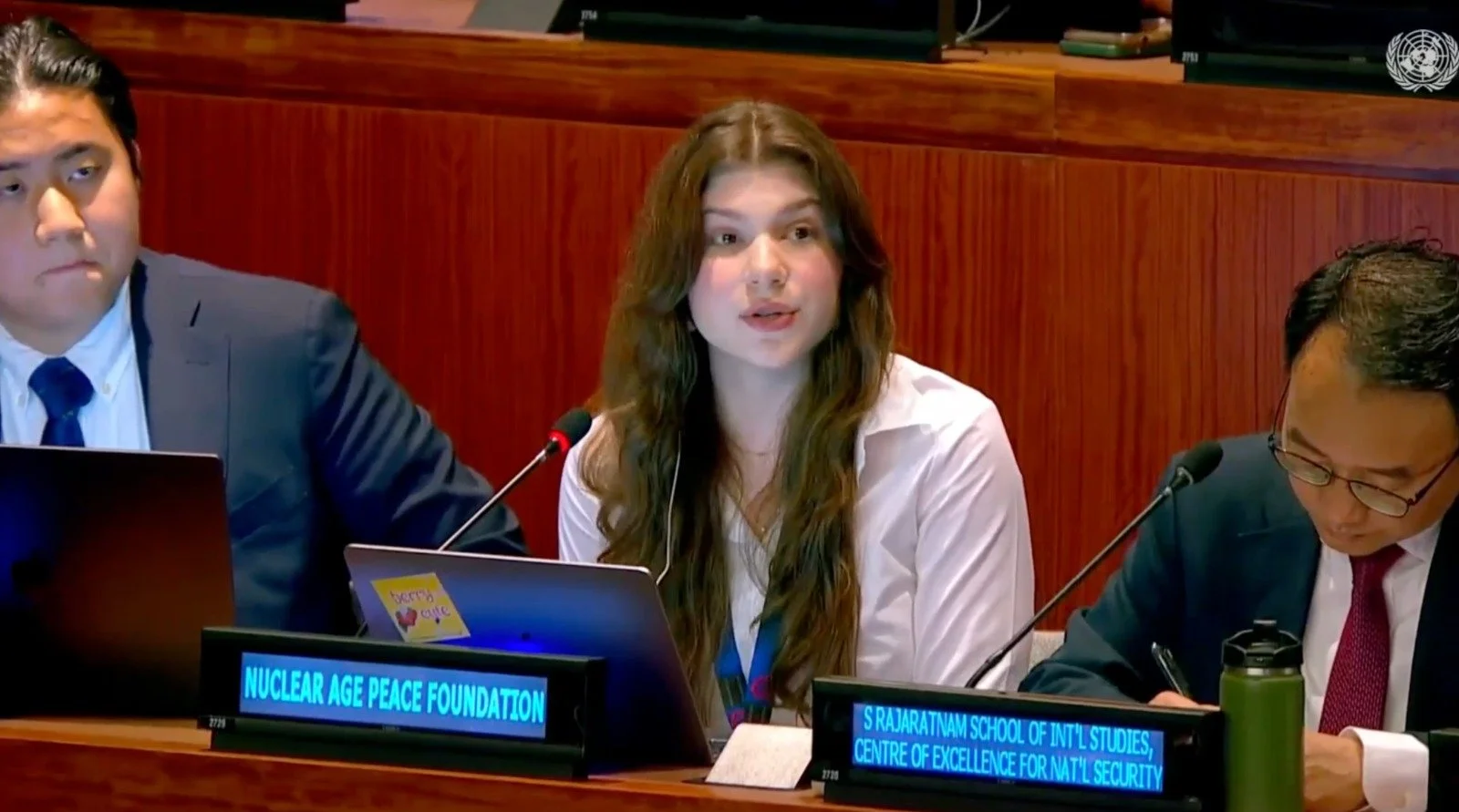Lydia Peevey Delivering Statement at the 2025 Open-Ended Working Group on ICTs
At the 2025 Open-Ended Working Group on ICTs (OEWG), Lydia Peevey of the Nuclear Age Peace Foundation (NAPF) and its youth initiative, Reverse The Trend (RTT), delivered a powerful intervention addressing the critical cyber security threats on civil society and the role youth should play to empower activism.
Lydia raised critical concerns about the evolving landscape of cyber threats and their implications for global security. Speaking at the UN Open-Ended Working Group on ICTs, she emphasized that cyber vulnerabilities in critical infrastructure pose unprecedented risks, particularly when these systems could be exploited by malicious actors to cause mass disruption or casualties.
A central focus of Lydia's address was the accountability gap that emerges when cyber operations blur the lines of attribution and responsibility. "The determination of who holds responsibility for cyber attacks resulting in critical infrastructure failures or civilian harm becomes deeply problematic," she noted, highlighting how this ambiguity threatens to undermine established international legal frameworks governing state behavior in cyberspace.
Lydia also drew attention to the dangerous potential for cyber tools to be repurposed as weapons, where attacks on civilian infrastructure or governmental systems could escalate conflicts and destabilize entire regions. She warned that the relatively low barrier to entry for cyber capabilities makes these tools accessible to both state and non-state actors, dramatically lowering the threshold for digital warfare.
Concluding her statement, Lydia called on the international community to strengthen the future permanent mechanism by embedding civil society and youth as true partners in cybersecurity governance, emphasizing that "our generation will live with the consequences of today's decisions on digital security and governance."
As a digital native advocating at the intersection of cybersecurity, peace, and international law, Lydia's intervention underscored the urgent need for inclusive, multigenerational engagement in shaping cyber norms. Her remarks highlighted how youth bring essential technical understanding and firsthand experience with digital technologies to policy discussions, positioning them not merely as recipients of training but as co-creators of the policies that will govern our digital future.
***Full Statement****
Chair, Excellencies, Distinguished Colleagues, Ladies and Gentlemen
My name is Lydia Peevey, and I am a youth activist with the Nuclear Age Peace Foundation and Reverse The Trend, NAPF’s youth initiative. I grew up in Singapore, am proud to be a Singapore Permanent Resident, and appreciate Singapore's efforts in guiding the OEWG’s process. I would like to recognize that the OEWG has strengthened global norms and opened space for more inclusive dialogue.
Chair,
I will focus my remarks on the importance of civil society and youth engagement in the OEWG’s process, and particularly on the critical role that youth can and must play as we transition to a future permanent mechanism. The draft Final Report acknowledges that engagement with civil society, NGOs, academia, and youth has strengthened legitimacy, transparency, and effectiveness in the OEWG’s work. But we must go further. In paragraph 52(m), the report encourages States to engage other interested parties, stakeholders, and youth in capacity building and training. This is critical. But we urge Member States to treat youth not just as recipients of training, but as co-creators of policy. Youth engagement brings community insight and an understanding of how technologies are used, abused, and experienced firsthand. Civil society is not just a supporting actor in global cybersecurity governance, but comprises implementers, technical experts, educators, and, especially in the case of youth, digital natives who understand how these technologies function and how they affect our societies. The report’s recognition of the need for diverse and sustained engagement must be backed by practical steps, including regular consultations, technical cooperation, inclusive cyber-capacity building, and clear pathways for stakeholder input in norm development. We are highly concerned about attempts to backtrack and limit the role of stakeholders.
Chair,
Our generation will live with the consequences of today’s decisions on digital security and governance, whether it’s AI-enabled conflict, the misuse of cyber tools against civilians or governmental actors, or attacks on critical infrastructure. The risks are real, and youth engagement is crucial in shaping responses. The OEWG has laid a strong foundation, but the future permanent mechanism must go further in embedding civil society, especially youth, as partners in this space. Finally, as someone who grew up in Singapore and now works with young peace builders from around the world, I’ve seen what happens when youth are given the tools and the trust to lead. The future of ICTs depends on us. Let’s build that future together.

